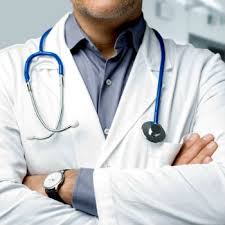
[Welcome to To Your Health. Our goal here is to create a space where we explore what’s important to people’s wellbeing, how we can live better, feel better and be healthier. In sickness and in health, as the saying goes. We’ll value facts over opinions and work to understand them, whether we like them or not.]
On the frontline during a crisis
When I began to write this column, I was hoping for an outlet to provide a little bit of wisdom and a little bit of wit. To educate, for sure, and have a little fun doing it. But unexpectedly we find ourselves in a more serious situation, struggling for context — and confidence. Telling our children that everything will be okay and trying to believe it as the words cross our lips.
As a physician I find myself thinking about two things. I was trained during the era of HIV and I confronted long ago the fear that my chosen profession could expose me, and by proxy my family, to harm. I’m older now, and this virus seems less threatening, but I know just as well that some of my colleagues have lost their lives caring for others and more will do so before this is all over. I think of how easily people go to social media to harangue a caregiver for a misdiagnosis or mistake, or, even worse, for an indelicate comment. There’s a part of me that sees the worst in all of this. A profession where people experience genuine danger requiring genuine courage serving a populace filled with outrage for insults and errors real and perceived. A profession that seems to have lost its revered place in society and is now well paid but less respected. A profession filled with burnout and frustration that seems, well, a bit lost.
Quite separately I’m also drawn to thinking about the times in my career where I’ve been privileged to care for people during times of urgency, times filled with pain, and end of life care. As horrible as it is to tell someone that their disease will not be cured, it’s in those moments of doctoring that one experiences the intimacy of the practice of medicine and feels the full extent of the calling. In those moments we get the chance to be present, the chance to comfort, and the chance to bear witness to the most meaningful moments in life.
So while many of us wonder what the next few months will bring us, I am hopeful that I and my colleagues can rise to the occasion and be present. I’m hopeful that people will once again see the value of expertise gained through a life of study and the importance of a steady hand developed through years of experience and delivered with love and compassion.
I’m hopeful that in this hardship we will rediscover forgotten truths about how we care for one another. As we do, here’s to your health.
The author is a Board Certified Family Physician who resides in the Shenandoah Valley.
***
PUBLISHER’s NOTE: As a reminder, Center for Disease Control always recommends everyday preventive actions to help prevent the spread of respiratory diseases, including:
- Avoid close contact with people who are sick.
- Avoid touching your eyes, nose, and mouth.
- Stay home when you are sick.
- Cover your cough or sneeze with a tissue, then throw the tissue in the trash.
- Clean and disinfect frequently touched objects and surfaces using a regular household cleaning spray or wipe.
- Follow CDC’s recommendations for using a facemask.
- CDC does not recommend that people who are well wear a facemask to protect themselves from respiratory diseases, including COVID-19.
- Facemasks should be used by people who show symptoms of COVID-19 to help prevent the spread of the disease to others. The use of facemasks is also crucial for health workers and people who are taking care of someone in close settings (at home or in a health care facility).
- Wash your hands often with soap and water for at least 20 seconds, especially after going to the bathroom; before eating; and after blowing your nose, coughing, or sneezing.
- If soap and water are not readily available, use an alcohol-based hand sanitizer with at least 60% alcohol. Always wash hands with soap and water if hands are visibly dirty.



Be the first to comment